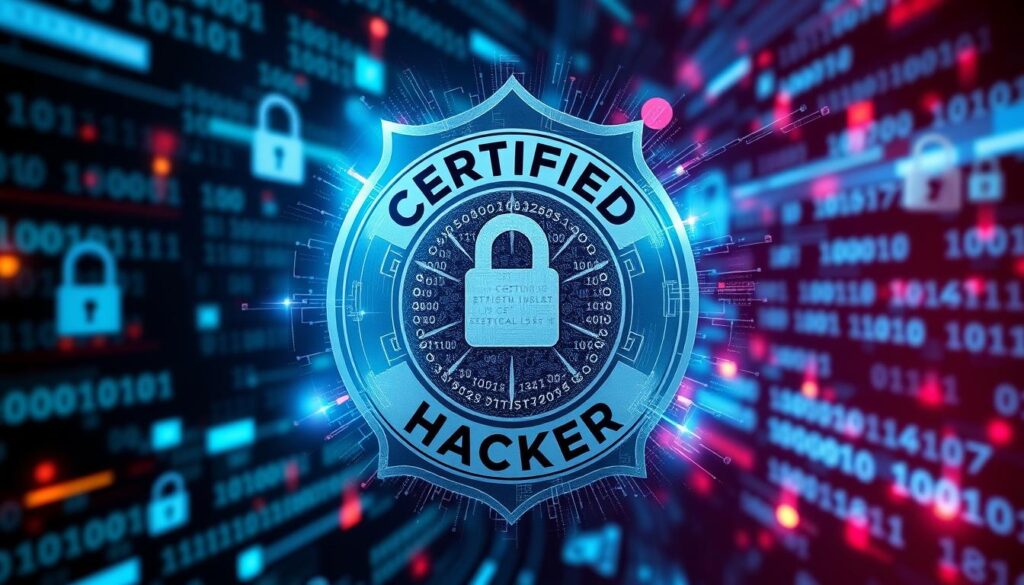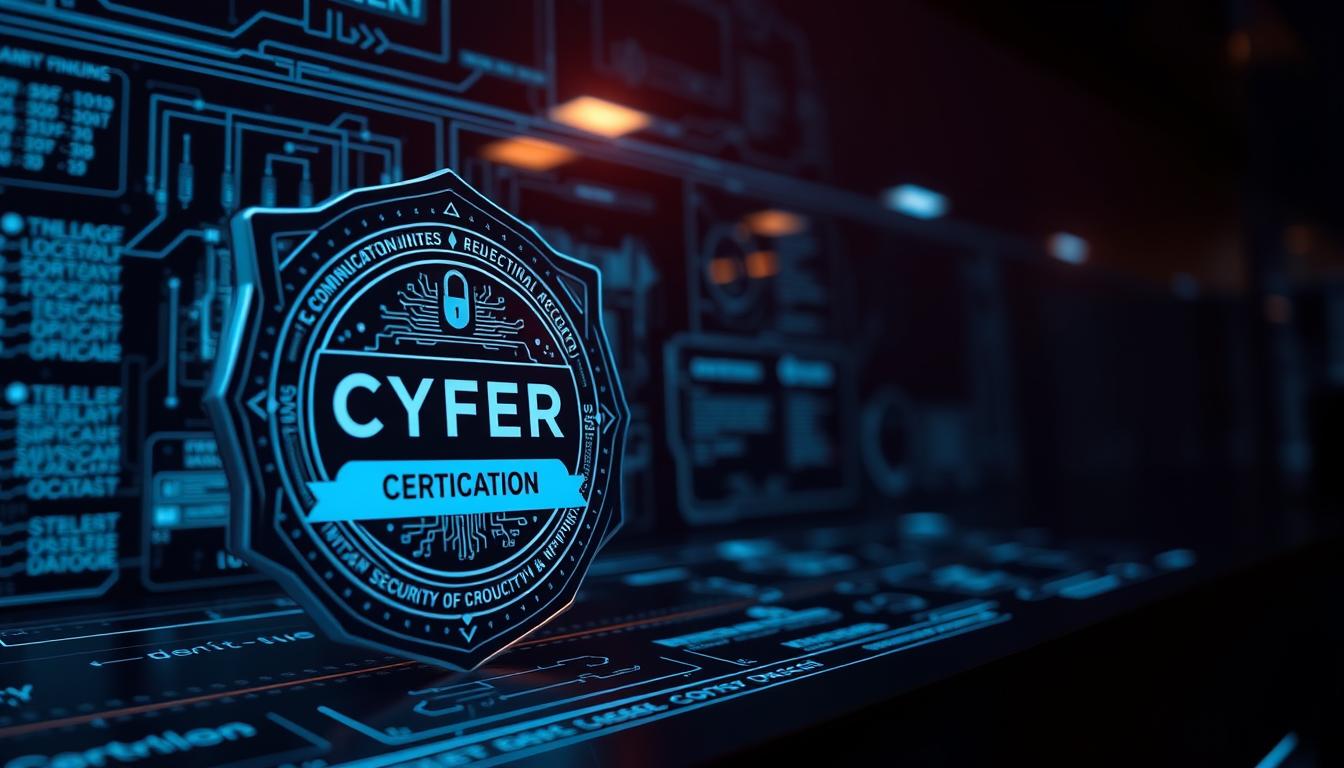Cybersecurity is one of the most sought-after fields today, with the rapid expansion of worldwide connections via the Internet, cloud adoption, and smart devices. As a result, cyberattacks have increased, multiplying the need for people with advanced cybersecurity skills to provide the highest level of data safety and security.
Companies, from start-ups to well-established corporations, are looking for cybersecurity personnel with hands-on experience. If you’re considering a career in this field, you may be wondering which certification is right for you.
Two popular IT certifications are CCNA (Cisco Certified Network Associate) and CEH (Certified Ethical Hacker). Understanding the key differences between them can significantly impact your career trajectory in the rapidly growing cybersecurity field.
Key Takeaways
- Understand the key differences between CCNA and CEH certifications.
- Learn how choosing the right certification can impact your career.
- Discover the specific skills validated by each certification.
- Explore how each certification aligns with different career paths.
- Make an informed decision based on your current skills and career goals.
Understanding IT Security Certifications
In today’s rapidly evolving IT landscape, understanding the value of certifications is crucial for career advancement. As you consider your next career step, it’s essential to evaluate how certifications can impact your professional journey.
Choosing the right certification depends on several factors. You need to assess your current skills, education, and certifications to determine the most suitable credential for your career aspirations. For many certifications, particularly advanced ones, specific skills or experience are required before attempting the certification exam.
The Growing Importance of Cybersecurity Credentials
The IT industry is witnessing a significant shift towards cybersecurity, making relevant certifications increasingly valuable. As cyber threats continue to evolve, the demand for professionals with specialized knowledge and skills is on the rise.
Key considerations when selecting a certification include:
- Assessing your current position in your IT career to determine which certification will provide the most significant advancement opportunities
- Understanding how the right certification can open doors to specialized roles, higher salaries, and greater job security
- Recognizing how certifications create clear career progression paths, from entry-level positions to advanced specialist and management roles
- Evaluating certifications based on their recognition in the industry, required investment in training, and long-term career value
How Certifications Impact Your IT Career Path
Certifications play a vital role in shaping your IT career path. They not only enhance your knowledge and skills but also signal your expertise to employers, making you a more competitive candidate in the job market.
By obtaining the right certification, you can:
- Position yourself for specific job roles and technical specializations
- Build a strategic certification roadmap that aligns with your short-term employment goals and long-term career aspirations
- Gain improved job performance and increased confidence in your technical abilities through the knowledge gained during certification preparation
As you navigate your IT career, certifications can serve as important stepping stones, enabling you to progress from entry-level positions to advanced roles.
What is CCNA?

The CCNA certification is a foundational credential in the IT industry, validating your ability to install, configure, and troubleshoot network solutions. It’s a stepping stone for those looking to advance their careers in networking.
Cisco Certified Network Associate Explained
The Cisco Certified Network Associate (CCNA) program is designed to equip you with the knowledge and skills necessary to navigate the ever-evolving landscape of network technology. By obtaining this certification, you demonstrate your proficiency in implementing, managing, and troubleshooting networks across various environments.
Cisco’s certification is highly regarded in the industry, signifying that you possess the expertise required to handle complex network infrastructures.
CCNA Prerequisites and Requirements
To pursue CCNA certification, you should have a basic understanding of networking concepts. While there are no formal prerequisites for taking the CCNA exam, having some hands-on experience and foundational knowledge in networking will be beneficial.
Core Skills Validated by CCNA
After completing the CCNA training course and exam, you will have the skills essential to advance your career in any direction. The certification validates a range of skills, including:
- You’ll develop proficiency in implementing and administering network solutions across a range of environments.
- The CCNA validates your ability to configure, troubleshoot, and manage Cisco routers and switches in both simple and complex networks.
- You’ll demonstrate competence in fundamental networking concepts including IPv4 and IPv6 addressing, subnetting, and routing protocols.
- The certification confirms your knowledge of network security principles and the ability to implement basic security measures.
- You’ll prove your understanding of wireless networking concepts and the configuration of wireless LAN controllers.
- The CCNA validates your skills in network automation and programmability, including understanding APIs and configuration management tools.
- You’ll show proficiency in WAN technologies and services, including VPNs and quality of service implementations.
- The certification verifies your ability to analyze network requirements and design appropriate solutions for small to medium-sized businesses.
By achieving CCNA certification, you establish yourself as a professional with the standard and rigor that firms recognize and rely on to achieve and exceed market expectations.
What is CEH?

The Certified Ethical Hacker (CEH) certification is a credential that validates your ability to understand and counter the tactics used by cybercriminals. This certification allows IT professionals to think like hackers, thereby enhancing their ability to defend against cyber threats.
Certified Ethical Hacker Certification Overview
The CEH certification is designed to equip you with the knowledge and skills necessary to identify vulnerabilities in a network and develop strategies to protect it. By understanding the methodologies used by hackers, you can adopt a proactive approach to cybersecurity.
This certification covers a wide range of topics, including reconnaissance techniques, system hacking, malware, social engineering, and web application security. By mastering these areas, you can significantly enhance your organization’s security posture.
CEH Prerequisites and Requirements
To obtain the CEH certification, you typically need to meet certain prerequisites, such as having a certain level of experience in the IT security field or completing a training program approved by the certifying authority.
Core Skills Validated by CEH
The CEH certification validates a range of critical skills, including:
- You’ll develop the ability to think like a hacker, understanding attack methodologies to better defend against them.
- The CEH validates your proficiency in reconnaissance techniques, including footprinting, scanning, and enumeration.
- You’ll demonstrate competence in system hacking methods, including password cracking, privilege escalation, and maintaining access.
- The certification confirms your knowledge of various malware types, their delivery mechanisms, and appropriate countermeasures.
- You’ll prove your understanding of social engineering techniques and how to conduct security awareness training to mitigate these risks.
- The CEH validates your skills in web application security, including identifying and exploiting common vulnerabilities.
- You’ll show proficiency in wireless network security, including the ability to detect and secure against wireless attacks.
- The certification verifies your ability to conduct comprehensive security assessments and develop effective remediation strategies.
CCNA vs CEH: Direct Comparison

A direct comparison of CCNA and CEH reveals key distinctions in their focus and benefits. Both certifications are valuable in the IT industry, but they cater to different career paths and professional goals.
Scope and Focus Areas
The CCNA certification focuses on networking fundamentals, including routing, switching, and network security. It’s designed for professionals looking to establish a strong foundation in network administration.
In contrast, the CEH certification is centered on ethical hacking and cybersecurity. It equips professionals with the skills to identify vulnerabilities and threats, making it ideal for those interested in security-focused roles.
Key differences in scope and focus:
- CCNA: Networking fundamentals, routing, switching, network security
- CEH: Ethical hacking, cybersecurity, vulnerability assessment
Exam Structure and Difficulty
The CCNA exam typically involves a single test that covers a broad range of networking topics. The difficulty level is moderate, requiring a solid understanding of networking concepts.
The CEH exam, on the other hand, is more challenging due to its comprehensive coverage of ethical hacking techniques and cybersecurity principles. It demands a deeper understanding of security-related topics.
Exam comparison:
- CCNA: Single exam, moderate difficulty
- CEH: Single exam, higher difficulty due to complex security topics
Certification Cost and Time Investment
Both certifications require a significant investment of time and money. The cost of the CCNA exam is around $300, while the CEH exam fee is also approximately $300-$500, depending on the training format chosen.
The time required to prepare for these exams varies based on prior experience and knowledge. Generally, candidates spend several weeks to a few months studying for either certification.
Cost and time investment summary:
- CCNA: Around $300, several weeks to months of preparation
- CEH: Approximately $300-$500, several weeks to months of preparation
Renewal Requirements and Validity Period
Both CCNA and CEH certifications are valid for three years. To maintain their certifications, professionals must meet specific renewal requirements.
For CCNA, renewal involves passing any of several Cisco certification exams, offering flexibility in specialization. For CEH, renewal requires earning 120 Continuing Professional Education (CPE) credits over the three-year period, emphasizing ongoing education in cybersecurity.
Renewal requirements:
- CCNA: Pass a Cisco certification exam
- CEH: Earn 120 CPE credits
Understanding these differences is crucial for making an informed decision about which certification aligns better with your career goals. Both CCNA and CEH offer unique benefits and can significantly enhance your IT career prospects.
Career Paths with CCNA Certification

Earning your CCNA certification is a significant step towards advancing your career in IT networking. This certification not only validates your skills but also opens up various career opportunities. As you progress in your career, you’ll find that the CCNA certification serves as a foundation for further growth and specialization.
Job Roles and Opportunities
The CCNA certification prepares you for a variety of roles in the networking field. Some of the key job roles include:
- Network Engineer
- Network Administrator
- Systems Engineer
- IT Consultant
- Network Support Specialist
These roles are available across various industries, including finance, healthcare, education, and government.
Salary Expectations for CCNA Professionals
CCNA certified professionals can expect competitive salaries. According to industry trends, the average salary for a CCNA certified individual is around $70,000 to $100,000 per year, depending on factors like location, experience, and specific job role.
Key factors influencing salary include:
- Level of experience
- Geographical location
- Specific job role
- Industry
Growth Potential and Advanced Cisco Certifications
The CCNA certification is just the beginning of your Cisco certification journey. You can progress to more advanced certifications like CCNP and CCIE, which can significantly enhance your career prospects and salary potential.
The career progression path is clear:
- CCNA: Foundation level
- CCNP: Professional level
- CCIE: Expert level
Each step up the certification ladder opens up new opportunities for career advancement and increased earning potential.
Career Paths with CEH Certification
As you consider advancing your career in cybersecurity, understanding the career paths available with a CEH certification is crucial. The Certified Ethical Hacker credential is not limited to penetration testing; it’s a versatile accreditation that applies to a broader range of activities in network and data protection.
Job Roles and Opportunities
With a CEH certification, you’ll have multiple paths for career advancement. You can specialize in specific attack vectors or move into security leadership roles. The certification serves as a foundation for more advanced EC-Council credentials like the Licensed Penetration Tester (LPT) or Certified Ethical Hacker Practical.
- You’ll find opportunities in incident response and digital forensics by combining CEH with forensic certifications.
- Moving into security architecture or security engineering roles is possible when you combine your CEH with additional technical certifications.
- The certification path can lead to senior positions like security consultant, principal security engineer, or chief information security officer (CISO).
Salary Expectations for CEH Professionals
CEH certification holders can expect competitive salaries, with variations based on factors like location, experience, and specific job roles. For the most up-to-date information on salary expectations, you can visit Readynez’s blog on CCNA or CEH, which provides insights into career prospects and salary ranges for certified professionals.
Growth Potential and Complementary Security Certifications
The CEH certification pairs well with complementary certifications like CISSP for security management, OSCP for advanced penetration testing, or cloud security credentials. By combining CEH with other certifications, you can enhance your career prospects and move into specialized security roles or management positions.
- Specialized knowledge in areas like IoT security or critical infrastructure protection can further enhance your career prospects.
- The CEH provides versatile skills that remain valuable as you progress toward more specialized security roles or management positions.
CCNA or CEH: Which Should You Choose?
In the ever-evolving IT landscape, selecting the right certification – CCNA or CEH – is a critical decision that can significantly impact your career trajectory. Your choice between these two prominent certifications should be guided by your career goals, current skill set, and the specific demands of your desired role.
For Networking Specialists
If you’re a networking specialist, CCNA is likely the more relevant certification for you. It validates your ability to install, configure, and troubleshoot networks, which is fundamental for many IT roles. The CCNA training focuses on the practical skills needed to manage and optimize network infrastructure.
For those with a strong foundation in networking, pursuing CCNA can lead to advanced Cisco certifications, further enhancing your career prospects. Your experience in network administration will be significantly boosted by the knowledge gained through CCNA training.
For Security-Focused Professionals
On the other hand, if you’re inclined towards security, the CEH certification is more aligned with your career aspirations. CEH demonstrates your understanding of ethical hacking techniques and your ability to identify vulnerabilities in systems. This certification is particularly valuable for those looking to work in roles that require a deep understanding of security threats and mitigation strategies.
CEH training equips you with the knowledge and skills necessary to think like a hacker, thereby enabling you to strengthen your organization’s security posture. For security-focused professionals, having a CEH certification can be a significant career booster.
For Career Changers
If you’re looking to transition into IT from another field, or if you’re seeking to shift your career focus within IT, both CCNA and CEH can be valuable. However, it’s essential to consider your background and the specific requirements of your desired role. For instance, if you’re moving into network administration, CCNA is a more appropriate starting point. Conversely, if your interest lies in security, CEH would be more beneficial.
Your decision should be influenced by the applications of each certification in your desired career path. Understanding the core skills validated by each certification can help you make an informed decision.
When to Pursue Both Certifications
If you’re aiming for roles that bridge networking and security responsibilities, such as a network security engineer or security architect, you should consider pursuing both CCNA and CEH certifications. Having both can demonstrate your versatility and comprehensive understanding of both defensive and offensive security measures.
- Pursuing both certifications is particularly powerful if you want to specialize in network security, where understanding both infrastructure and threats is crucial.
- Starting with CCNA and then pursuing CEH can be a strategic approach, as understanding the infrastructure you’ll be testing and securing is beneficial.
- Having both credentials can open more doors and provide greater job security in the evolving IT landscape.
In conclusion, whether you should choose CCNA or CEH depends on your specific career goals and current experience. If you’re seeking employment, obtaining both certifications can be highly advantageous. By carefully considering your career aspirations and the skills you need to acquire, you can make an informed decision that aligns with your professional objectives.
Preparation Strategies for Success
To succeed in obtaining your CCNA or CEH certification, it’s crucial to have a well-structured preparation strategy. This involves understanding the exam requirements, gathering the right study materials, and practicing with relevant tools and techniques.
Study Resources for CCNA
For CCNA certification, you’ll need to focus on networking fundamentals, including routing, switching, and network security. Official Cisco study materials are a great place to start, as they provide comprehensive coverage of all exam topics.
- You’ll benefit from using Cisco’s official CCNA Routing and Switching study guide.
- Online courses and video lectures can supplement your learning, offering flexible study options.
- Practice with network simulators like Cisco Packet Tracer to gain hands-on experience.
Study Resources for CEH
Preparing for the CEH certification requires a different approach, focusing on ethical hacking techniques and security measures. The EC-Council’s official training materials are essential for understanding the exam domains.
- The CEH preparation often benefits from instructor-led training, either in-person or virtual, to guide you through complex security concepts.
- You’ll find specialized CEH study guides from publishers like Sybex and McGraw-Hill that break down the material into manageable sections.
- Hands-on practice with security tools in a lab environment, using platforms like Kali Linux, is crucial for CEH preparation.
- Utilize practice exams from EC-Council and third-party providers to assess your knowledge and identify weak areas.
By combining these study resources and staying committed to your preparation plan, you’ll be well on your way to achieving your CCNA or CEH certification.
Conclusion: Making Your Final Decision
With multiple certification paths available, selecting the right one that aligns with your career aspirations is crucial. As you’ve explored the details of CCNA and CEH certifications, it’s essential to reflect on your current skills, interests, and the specific industry sector you wish to enter.
Your decision should be guided by your career goals and the job market demands in your region. If you’re inclined towards network infrastructure and implementation, particularly in Cisco environments, CCNA is likely your best bet. Conversely, if your passion lies in security testing and vulnerability assessment, CEH might be more suitable.
Consider the following key factors as you make your decision:
- Align your certification choice with your career objectives and existing skills.
- Research current job postings to understand the demand for specific security certifications in your area.
- Engage with professionals who hold these certifications to gain insights into their practical applications.
- Weigh the time and financial investment against potential career benefits and salary increases.
- Reflect on your learning style and whether you prefer the structured nature of networking or the creative aspects of security testing.
Ultimately, the certification journey is just the beginning. Continuing education and practical experience will be pivotal in determining your success in the field.
FAQ
What is the validity period of the Cisco Certified Network Associate certification?
The Cisco Certified Network Associate certification is valid for three years, after which you need to recertify to maintain your credential.
How many years of experience do I need to become a Certified Ethical Hacker?
To become a Certified Ethical Hacker, you typically need at least two years of experience in information security or a related field.
What kind of job roles can I expect with a CCNA Security certification?
With a CCNA Security certification, you can expect job roles such as network security engineer, security specialist, or network administrator, with a focus on securing network infrastructure.
Is the Certified Ethical Hacker certification recognized globally?
Yes, the Certified Ethical Hacker certification is recognized globally and is considered a standard credential in the field of ethical hacking and cybersecurity.
Can I pursue both CCNA and CEH certifications?
Yes, you can pursue both CCNA and CEH certifications, which can be beneficial for a career in network security or cybersecurity, as it demonstrates your expertise in both networking and ethical hacking.
What is the GIAC Security Essentials certification, and how does it compare to CCNA or CEH?
The GIAC Security Essentials certification is a credential that validates your knowledge of security fundamentals, and while it’s not directly comparable to CCNA or CEH, it can be a complementary certification for IT professionals.
How long does it take to prepare for the CCNA or CEH exam?
The preparation time for the CCNA or CEH exam varies depending on your background and experience, but on average, it can take several months of study and hands-on practice to feel confident for the exam.
